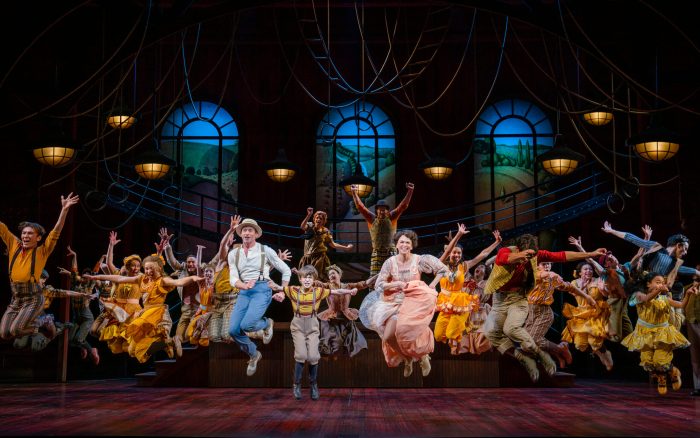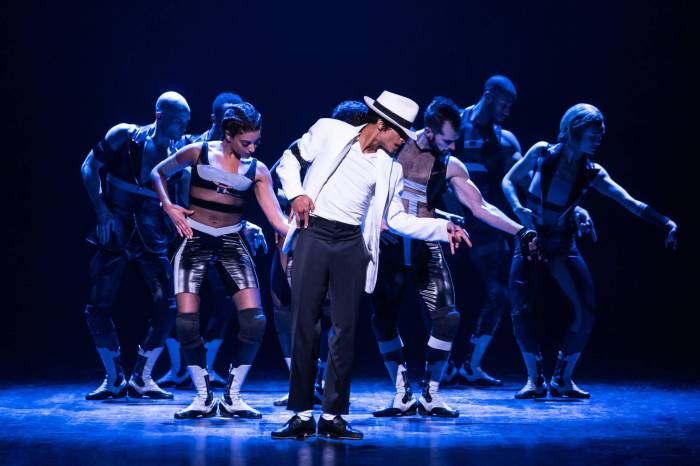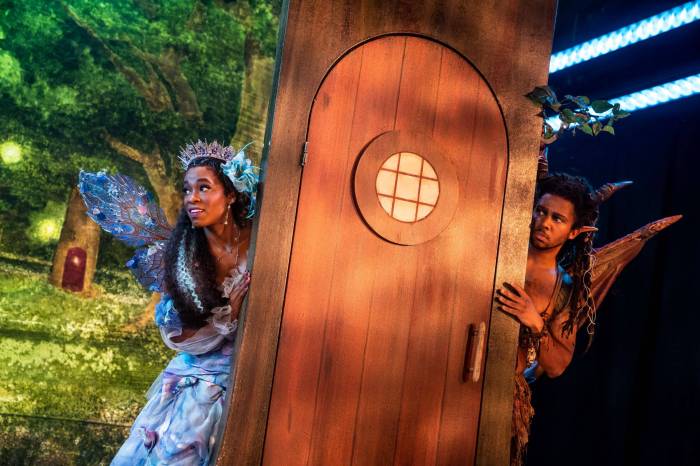“Is anybody there?” “Does anybody care?”
These words are sung by John Adams near the end of the musical “1776,” when it seems that the Declaration of Independence might not pass, and his work for nearly two years will be undone. In previous productions, it has been a quiet soliloquy — Adams to himself.
However, in the glorious and powerful revival of the classic show now at Roundabout, that soliloquy also becomes an anthem, a challenge to contemporary audiences that rights and liberties so dearly won by our founding fathers may slip away if we as a country “piddle twiddle, and resolve” and do not take a stand for the nation’s defining principles — chiefly that all men are created equal. “All men” may look very different in 2022 than in 1776, but the need is no less desperate.
Directed by Jeffrey L. Page and Diane Paulus, this “1776” joins such recent productions as Daniel Fish’s “Oklahoma” and David Cromer’s “Our Town” in boldly re-imagining culturally entrenched classics to blow away the cobwebs of palliative nostalgia and examine deeper truths within the texts and subject matter. In the case of “1776,” Page and Paulus have achieved this through a cast that is female presenting and include diverse representations of race, ethnicity, and gender— female, transgender and non-binary. This alone, without changing Peter Stone’s original book, looks at the treasonous rebellion against the tyranny of England through a new lens. The white male hegemony that is part of the country’s origin story must be reconsidered in light of who we are as a nation today. It is subtle, powerful, and inescapable, not to mention theatrically bold and thrilling. The simplicity of the casting without commentary demands that we hear the work anew.
In the context of musical theater history, “1776,” which debuted in 1969, was a response to “Hair,” which had premiered a year earlier. (“Hair” was initially deemed too controversial for Broadway by many producers.) The story of the Declaration of Independence and its jingoistic themes was an antidote to those counter cultural hippies seeking to undermine the nation. Though “1776” would win the Tony for Best Musical, “Hair” would run nearly a year longer, attracting a new generation to the theater. In the ensuing years, both shows have been revived several times, including Paulus’ revival of “Hair” in 2009, which like this production of “1776” also began at the American Repertory Theater.
For Roundabout, the score has been brilliantly adapted for largely female voices. The original bellowing male chorus of the opening number, “Sit Down, John” here has a different kind of power than the original, but it is no less galvanizing. Other songs like “Molasses to Rum,” which calls out the hypocrisy of the North’s move against slavery since all the colonies participate in, and profit from it, has a new ferocity, particularly as sung by Sara Porkalob as Edward Rutledge. The song “Momma, Look Sharp,” which mourns the human cost of war, takes on a new poignancy as it is supported by a chorus of grieving women. Even the two female roles — Martha Jefferson and Abigail Adams — have wit, honesty, playfulness, and undeniable sexual energy.
The cast is superlative across the board and a beautifully balanced ensemble. Crystal Lucas-Perry as John Adams is the center of the show and captures Adams’ passion and frustration beautifully. Chafing against the complacency of a do-nothing Congress, her Adams is at once intensely humor and a metaphor for the disruption required to drive change. Elizabeth A. Davis as Jefferson is a quiet counterpoint to Adams, no less committed to the cause. Patrena Murray as Benjamin Franklin has an august sagacity, the common perception of Franklin, and at the same time sparkles with good humor. Carolee Carmello as John Dickinson, and Adams’ chief opponent to independence, brings power and presence to the role. Incidentally, Carmello played Abigail in Roundabout’s earlier revival 24 years ago.
As noted, there are many moments in the show that make one sit up and think of our history in a new way. None, though, is as profound as the argument to remove the slavery clause from the Declaration. The harsh and hurtful bargain that had to be made to achieve unanimity in the vote for independence takes on a new and heartbreaking resonance. The signers of the Declaration could not have known that it would be another eighty-nine years until the Emancipation Proclamation, but today’s audiences do — and we are reminded that sometimes even positive progress has a terrible cost.
In our current fraught times, this is an important lesson. As a result, it is not radical to reimagine “1776,” it is the right thing to do.
“1776” | American Airlines Theatre | 227 West 42nd Street | Tues, Thurs 7 p.m.; Weds, Fri, Sat 8 p.m.; Weds, Sat 2 p.m.; Sun 3 p.m | $79-$260 | Roundabouttheatre.org | 2 hours, 40 min, 1 intermission

![[0001] The company of Roundabout Theatre Company’s 1776. Photo by Joan Marcus, 2022](https://gaycitynews.com/wp-content/uploads/2022/10/0001-The-company-of-Roundabout-Theatre-Companys-1776.-Photo-by-Joan-Marcus-2022-scaled.jpg?w=1200)

































